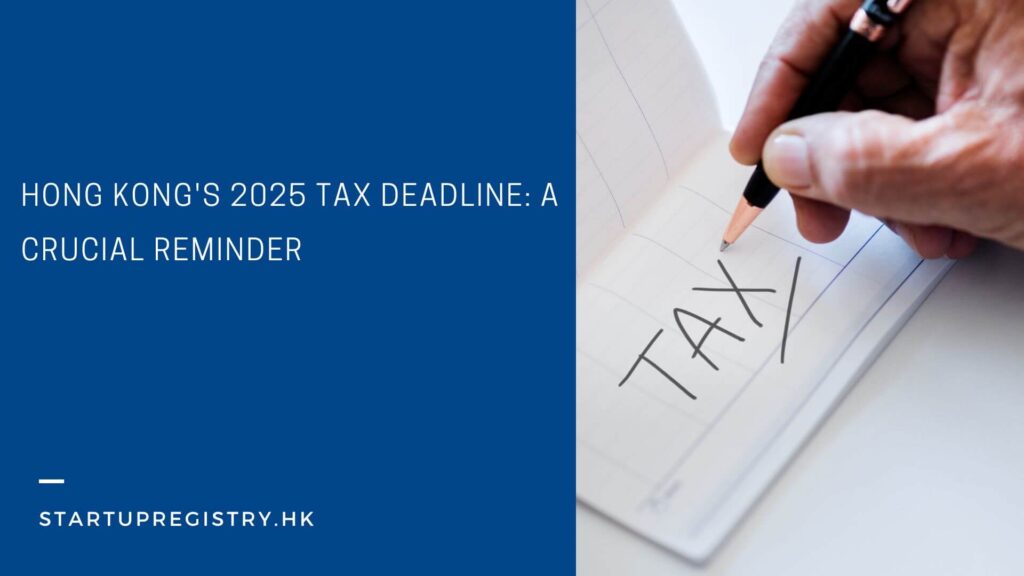Hong Kong is renowned for its simple and competitive tax system. This city has one of the lowest tax rates. It attracts both local and international talent to operate in Hong Kong. However, businesses and individuals need to stay on top of the tax filing deadlines. Understanding the different Hong Kong’s 2025 Tax is critical for timely filing. Late filing will incur severe financial and legal penalties.
Compliance with the tax filing deadlines enables you to meet the due dates and avoid tax penalties. So, if you are an individual living in Hong Kong or have set up your business there, then this article will be of interest to you. This article provides a comprehensive guide to the Hong Kong tax deadline of 2025, covering profits tax, personal income tax, and more.

Key Tax Deadlines in Hong Kong for 2025
Hong Kong has various kinds of taxes and tax deadlines. The key Hong Kong tax deadlines for 2025 are as follows:
1. Profits Tax
Tax Filing Deadlines:
For the Hong Kong tax year 2024/2025, businesses are required to file an annual profits tax return. The filing deadline depends on the financial year-end date of the company.
- Standard Deadline: Generally, the profits tax return must be submitted within one month from the date of issue by the Inland Revenue Department (IRD).
- Extended Deadlines with an Authorized Tax Representative: If you engage an authorized tax representative, you may qualify for extended deadlines:
- For the financial year-end between 1 December and 31 December, the extended deadline is 15 August 2025.
- For the financial year-end between 1 January and 31 March, the extended deadline is 15 November 2025.
The IRD assesses the tax liability based on the annual tax return, combining the final tax for the fiscal year ending March 31, 2025, and the provisional tax for the upcoming year.
2. Personal Assessment Tax Deadlines
The standard deadline for filing personal income tax in Hong Kong for 2025 is June 2, 2025, covering the financial year ending on March 31, 2025. Income assessed under personal tax includes employment, sole proprietorships, and property rental.
Extensions to Deadlines:
- If you operate a sole proprietorship, the filing deadline may be extended based on your financial year-end and the engagement of an authorized tax representative.
- Taxpayers who file their returns electronically may also qualify for an extended deadline.
3. Other Tax Deadlines
Some other important deadlines in Hong Kong are given below.
- Property Tax: The property tax deadline in Hong Kong is the same as the personal assessment tax deadline. Property owners need to file returns for rental income and related profits by the same deadlines as personal assessment tax.
- Stamp Duty
The deadline for stamp duty in Hong Kong varies depending on where the sale and purchase agreement is executed:
- Executed in Hong Kong: Stamp duty payments for property transactions and lease agreements must be made within 14 days of the date of execution.
- Executed outside Hong Kong: If the sale and purchase agreement is executed outside of Hong Kong, the deadline is 30 days from the date of execution.
Tax Rates and Allowances in 2025
Hong Kong offers a low tax rate. This makes it efficient to reside and run a business in Hong Kong. Some tax rates in Hong Kong are mentioned below.
1. Profits Tax Rates
Hong Kong adopts a two-tiered profits tax system, with different rates for corporations and unincorporated businesses (e.g., sole proprietorships and partnerships):
- For Corporations:
- 8.25% on the first $2,000,000 of assessable profits.
- 16.5% on any assessable profits exceeding $2,000,000.
- For Unincorporated Businesses:
- 7.5% on the first $2,000,000 of assessable profits.
- 15% on any assessable profits exceeding $2,000,000.
This progressive system aims to support small and medium-sized businesses while ensuring fair taxation for larger entities.
2. Personal Assessment Tax Rates and Allowances:
Hong Kong’s salaries tax is calculated using progressive rates on net chargeable income (after deductions and allowances) or at a standard rate of 15% on net income, whichever is lower. The progressive rates for 2025 are as follows:
- 2% on the first HK$50,000
- 6% on the next HK$50,000 (i.e., income from HK$50,001 to HK$100,000)
- 10% on the next HK$50,000 (i.e., income from HK$100,001 to HK$150,000)
- 14% on the next HK$50,000 (i.e., income from HK$150,001 to HK$200,000)
- 17% on income exceeding HK$200,000
This progressive system ensures a fair tax burden while providing allowances and deductions to reduce taxable income.
3. Allowances and Deductions
Taxpayers in Hong Kong can claim the allowances mentioned below:
- Basic Allowance: HK$132,000
- Married Person’s Allowance: HK$264,000
- Child Allowance: The child allowance for salary tax purposes in Hong Kong is HK$120,000 per child. Additionally, for each child born during the tax year, an extra HK$120,000 is granted as a one-time allowance.
- Dependent Parent/Grandparent Allowance: Taxpayers can claim the dependent parent or grandparent allowance for maintaining their parents or grandparents based on age and care requirements:
- HK$50,000 per dependent parent/grandparent aged 60 or above, or if they are eligible to claim a government disability allowance.
- HK$25,000 per dependent parent/grandparent aged 55 to 59.
- If the dependent parent or grandparent resides with the taxpayer continuously throughout the year, an additional HK$50,000 (for 60+ years) or HK$25,000 (for 55–59 years) can be claimed.
- Self-Education Expenses: Up to HK$100,000
3. Other Tax Rates and Allowances
Hong Kong’s tax system is simple and transparent, with a focus on specific tax categories. Some notable taxes include:
- Salaries Tax is levied at progressive rates based on assessable income or at a standard rate of 15% on net income, whichever is lower.
- Property Tax is charged at a standard rate of 15% on the net assessable value of rental income derived from properties in Hong Kong after deductions.
- Stamp Duty is imposed on certain documents, such as those related to property transactions, lease agreements, and the transfer of shares.
- Motor Vehicle First Registration Tax: Instead of a vehicle excise duty, Hong Kong imposes a Motor Vehicle First Registration Tax (FRT) on the initial registration of a vehicle. The FRT rate varies depending on the type and taxable value of the vehicle.
Tax Filing Methods in Hong Kong
Hong Kong offers two basic methods of tax filing. They are electronic filing and paper filing.
1. Electronic Filing
Electronic filing in Hong Kong can be done through the online platform named eTax. It is provided by the Inland Revenue Department (IRD). Filing taxes online is convenient, fast, secure, and environmentally friendly. It allows you to check filing status and manage tax payments easily. Fill out the form online, register for an eTax account, complete the adequate papers, and submit the papers electronically. The method is also satisfactory for those wishing to make online submissions before the Hong Kong tax filing deadline.
2. Paper Filing Process
Another filing method utilized in the organization is paper filing. The IRD offers physical forms that you could fill out by hand. The same documents must then be submitted either by mail or in person. It is necessary to obtain all the essential forms from the IRD. You will need to fill them out accurately and attach supporting documents with them. Paper filing may be preferred by those who don’t have access to electronic systems. However, it is a less environmentally friendly and less efficient way to file taxes.
Electronic filing is encouraged, especially for personal taxes, to streamline the process and reduce environmental impact. However, businesses must adhere to the IRD’s paper submission requirements where applicable.
Penalties for Late Filing
Filing taxes after Hong Kong tax deadlines in 2025 can have significant impacts on you. The late filing penalties for Hong Kong taxes are given below.
1. Financial Penalties
Financial penalties are the most basic punishment IRD gives for missing tax deadlines. The interest may be charged based on a percentage of the outstanding tax. Also, it stated that fines will be there if principles are not followed. A continual deferral of debts and noncompliance with the tax act have caused the rates to rise.
2. Potential Legal Consequences
Anybody who carries out tax filing, after-tax periods, or even does not adhere to the laws probably gets trapped by legal repercussions. It might reach prosecution and orders together with criminal penalties for contempt of the court rules. Hence, it’s crucial to avoid penalties arising from late filing to run sound financial affairs.
Tips for Taxpayers in Hong Kong
The following practical tips will help taxpayers avoid complications and enhance their level of tax compliance.
1. Record-Keeping
Host records of income and the respective expenditures together with the relevant deductions severally in a year. Documentation enhances compliance, whereas timely and correct record- keeping make the filing process easier. Credit risk management benefits from documentation. It also decreases the likelihood of mistakes and prevents tax issues in Hong Kong from occurring.
2. Tax Planning
Tax management for Hong Kong businesses is crucial for tax filing. Planning tax payments ahead of deadlines eliminates last-minute stress. Effective tax planning for Hong Kong businesses can result in significant savings. You can use allowances and deductions to minimize tax liability.
3. Professional Advice
Get professional help from the best tax advisors in Hong Kong. Tailored advice on deductions, filing strategies, and compliance allows you to file taxes on time. Tax advisors can assist with complex filings, such as changes in a financial year or claiming special allowances.
Do You Need Help With Your Accounting in Hong Kong?
Filing taxes on time is not just about compliance. It is a key aspect of financial management. If you’re unsure about navigating Hong Kong tax rates in 2025, then you can read the above article. The above article covers the key deadlines for taxes in Hong Kong 2025, tax rates and allowances, filing methods, penalties, and tips for taxpayers. It is essential to file taxes on time as it shows your seriousness towards the business and creates a positive image as an individual.
If you need a professional advisor for your tax management, then Startupr is here to help you. It is one of the best tax advisors in Hong Kong. Startupr specializes in supporting businesses and individuals with tax filing, accounting, and compliance. The expert team at Startupr can help you meet critical deadlines, including the personal income tax deadline in Hong Kong in 2025.


